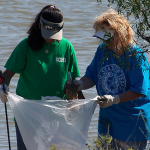Critics Smell Trouble With Sewage Spill Bill

Photo by Al Barry/Three Lions/Getty Images
Proponents say the bill would cut down on the red tape of reporting requirements for wastewater utilities.
A new bill could stop a lot of the crying over spilled sewage in Texas.
Lawmakers and critics voiced various concerns about a sewage spill bill at a House Natural Resources Committee meeting Tuesday at the Capitol. The bill, HB 824 authored by Bill Callegari, R-Houston, would put a floor on the size of spills that must be reported by utilities to the Texas Commission on Environmental Quality.
“This is a common sense solution to an issue that I think causes a fair amount of paper work,” said Callegari. “I personally, and I think a lot of you here, have been concerned with some of the red tape, if you will, in this state.”
If the bill passes, most spills below 1,500 gallons would not need to be reported to authorities (by comparison, a standard milk hauling truck holds around 4,000 to 5,000 gallons).
Callegari added that Texas’ rules are more stringent than federal regulations and a number of wastewater utilities around Texas support his bill.
Utilities would still be required to clean any spill that occurs, and if a spill has the potential to enter a water body it must be reported to the TCEQ.
But aside from reducing paperwork, how will authorities know if something harmful was left behind by a spill that was under the reporting threshold?
Rep. Eric Johnson , D-Dallas, asked that question to Carol Batterton, Executive Director of Water Environment Association of Texas (WEAT), who consulted with Callegari on the legislation and testified in support of the bill.
“A lot of these things happen in neighborhoods, or could happen in neighborhoods … If there was something that would cause an environmental harm, my guess is that TCEQ is going to get notified by a citizen,” Batterton said.
“But there is no formal way we do this?” Johnson asked Batterton.
“There wouldn’t be,” Batterton said.
Foster Crowell, Wastewater Director for the City of Corpus Christi, said that the 1,500-gallon reporting exemption would nix 99 percent of the sewage spill reporting his utility would have to do. Crowell testified in favor of the bill.
Overall, 80 percent of the average 2,500 sewage spills reported each year in Texas would not be reported if the bill passes, according to testimony at the meeting.
That’s a lot of paperwork. Literally: the TCEQ still uses mostly paper forms for reporting sewage spills, Batterton said.
Other states mentioned at the meeting already have reporting requirements similar to what Callegari’s bill would create in Texas, but set the limit for reporting wastewater spills at a lower amount. California and North Carolina have similar 1,000-gallon exemptions and South Carolina has a 500-gallon one, said Robert Martinez, Director of the Environmental Law for TCEQ, who testified as a neutral party at the meeting.
The 1,500-gallon exception has no environmental or scientific basis, according to testimony.
Johnson said the committee should think about lowering the amount below 1,500 gallons.
Sen. Glen Hegar, R-Katy, is filing a companion bill, SB 584, in the Senate. The TCEQ would not comment on the pending legislation.
Possible environmental effects of more relaxed reporting requirements worry the Greater Edwards Aquifer Alliance. While the bill states any spill with potential to enter a water body must be reported regardless of size, it can be difficult to estimate the likelihood of penetration into an aquifer.
The Edwards Aquifer has complex recharge zones, said Eric Allmon, a lawyer representing the Alliance who testified at the meeting against the bill.
At the end of the discussion of HB 824, Callegari noted that this isn’t his first time filing spill legislation.
“A few sessions ago, we passed a similar bill regarding gasoline and gasoline spills,” Callegari said. “Like if you’re filling up your boat with gasoline and you get a few drops in the water.”
